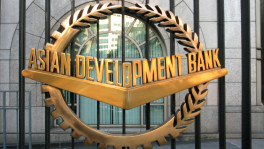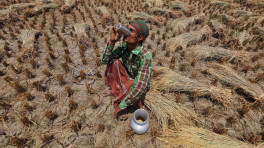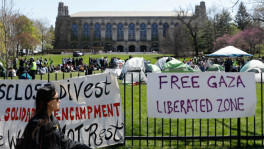Get down to reality, improve life: CPD

The Centre for Policy Dialogue (CPD) has said the government should abandon its high ambition about Gross domestic product (GDP) growth and instead announce the next budget as a roadmap to battle the pandemic crisis and rescue the economy.
The civil society think tank has also proposed preparing a pragmatic and expansion-oriented budget giving thrust to four sectors including health and agriculture to deal with the immediate crisis.
The organisation suggested increased allocation to the health sector, go for foreign borrowing to meet the revenue deficit, raise the taxable income level, and finance the priority projects first.
It also suggested that a 5 percent budget deficit would not be harmful in planning for a recovery from the pandemic fallout.
The CPD presented these recommendations to the government on Sunday in a virtual press briefing styled "State of the Bangladesh Economy in FY2019-20 and Budget Challenges".

In her statement, CPD Executive Director Fahmida Khatun said, "This year's budget must be formulated keeping in mind four areas – heath, agriculture, social safety net and employment."
All avoidable expenditures in the country's budget system should be curtailed in the next budget, she suggested, adding the government has to enhance its capacity to implement the budget.
"Instead of an unrealistic revenue and expenditure framework, the government must come up with an explicit roadmap," Fahmida continued.
Urging the government to focus on reducing unnecessary and unproductive expenses, she said, "Necessary measures must be taken to widen the tax net and prevent capital flight in order to meet increased demand for money in the wake of the Covid-19 pandemic."
Towfiqul Islam Khan, senior research fellow at the CPD, presented the keynote paper. He highlighted the economic situation in the first three quarters of the current financial year and the CPD's proposals for the next budget.
The think tank has estimated that the country's GDP growth in FY2020 is likely to come down to about 2.5 percent under the most optimistic scenario if further "general holidays" are not announced or stricter measures are not enforced during the rest of the fiscal year.
The CPD in its report "Challenges of Policy Making in Times of Pandemics" says, "Five sectors of the economy were heavily affected by the shutdown and supply disruptions during the two-month general holidays.
"Sectors such as manufacturing, construction, hotels and restaurants, transport, storage and communication, and community, social and personal services are likely to be the hardest hit in this period.
Towfiqul said that the pattern of Bangladesh's growth trend will depend not only on the duration and evolution of the ongoing contagion but also on the correct and sufficient measures taken to counter the pandemic.
For a restart and recovery of economic activities, there has to be effective implementation of the measures and there should be enforcement capacity. An enabling political economy environment is also a must for growth.
The CPD also called for setting a realistic revenue earning target.
Towfiqul said, the revenue shortfall for the current fiscal year, against the original target, has been re-estimated at around Tk1,25,000 crore. If the government falls short of its revenue target for the current fiscal year by this huge sum, it will be impossible for the government to achieve a 56.2 percent growth in revenue collection in FY2021.
Commenting on this, CPD's Distinguished Fellow Dr Mustafizur Rahman said that the government's target of attaining a 56 percent growth target in revenue collection was completely unrealistic.
In his statement, Khandaker Golam Moazzem, CPD's research director, said the real problem is an impractical expenditure framework based on the impractical revenue target.
Emphasising an increase of the health budget based on proper demand assessment, Towfiqul said, "The health sector should get priority in the national budget for FY2021 for obvious reasons. There is no way to contain the Covid-19 without sufficient allocations to the sector."
"The allocation for the health sector needs to be increased at least to 2 percent of the GDP, which is now 0.69 percent of the GDP," he stated.
The think-tank further projected that remittance inflow to lower-middle income countries (LMICs) of which Bangladesh is one, may decline by about 20 percent in 2020, while for South Asia the decline could be to the tune of 22.1 percent. Foreign direct investment (FDI) flow is also likely to contract in 2020 by about 35 percent.
The CPD has conducted an analysis to explore implications of COVID-19 in the short-term on poverty and inequality of Bangladesh, Towfiqul Islam Khan said. The analysis showed negative shocks on household consumption in the range of 9-25 percent, which would lead to an increase of national (upper) poverty rate to 35.0 percent in 2020 from 24.3 percent in 2016.
According to the CPD, there is no harm in setting a budget deficit at 5 percent for mitigating the Covid-19 fallout. Huge amount of money is required to recover the economy at this moment.
The organisation has suggested the government to give highest attention towards foreign borrowing to meet the deficit.
The minimum limit of taxable income should be raised to Tk3.5 lakh from the present Tk2.5 lakh for the benefit of small entrepreneurs, the CPD suggested, adding the government, however, needs to be cautious about lowering corporate tax.
Suggesting the government not to allow whitening of black money, Towfiq said it will not produce any good result.
The government should continue financing priority projects under the annual development plan (ADP), he said, adding, financing the less important or newly approved projects can be kept on hold.
Dr Mustafizur Rahman said that increased allocation needs to be made on the health sector to save the people in these hard times. He called for widening the tax net and preventing tax evasion to that end.
He also suggested creating special employment opportunities for migrant workers who have come back amid the pandemic and devaluing local currency to create opportunities for those who are staying abroad.


 Keep updated, follow The Business Standard's Google news channel
Keep updated, follow The Business Standard's Google news channel















